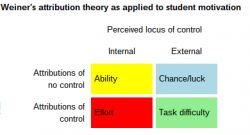I firmly believe in the power of using the locus of control theory to have a richer, more fulfilling career. Read on for how you can use the locus of control theory to evaluate job candidates.
 Last week I had a discussion with another local HR pro, and we were talking about interview questions that help to discern what candidates lack the requisite people skills to get the job done. We’ve all run across candidates who may interview very well, but then they turn out to be a nightmare once they are on board.
Last week I had a discussion with another local HR pro, and we were talking about interview questions that help to discern what candidates lack the requisite people skills to get the job done. We’ve all run across candidates who may interview very well, but then they turn out to be a nightmare once they are on board.
One of the questions that she likes to use is this:
What were people like at your last job?
In her opinion (and mine), that can tell you a lot about someone. Let’s look at my theory for why that is, then we’ll get into how it applies.
Locus of control theory and meaning
Here’s a snippet from Wikipedia as a refresher:
Locus of control is a theory in personality psychology referring to the extent to which individuals believe that they can control events that affect them… A person’s “locus” (Latin for “place” or “location”) is conceptualized as either internal (the person believes they can control their life) or external (meaning they believe that their decisions and life are controlled by environmental factors which they cannot influence).
In terms that apply to the workplace, I see it as this:Â you either see life as a series of things happening to you, or you see life as a series of actions you take to make things happen.Â
It’s an oversimplification, but it works for the purposes of this discussion. Now let’s dig into how it plays into the question referenced above.
Locus of control theory at work
Let’s say you have two candidates in front of you. They’re fairly evenly matched with regard to skills and experience. Then you ask them both the question, “What were people like at your last job?”
- Candidate A-I worked with a great group of people. We got along well and it was a great experience for me.
- Candidate B-I worked with a terrible group of people. There was constant fighting and I could never get any work done. It was a terrible experience.
Here’s the kicker–those people could have both come from the same company. Now I know and agree that there are some organizations where Candidate B’s comments would be legitimate, but it’s important to dig deeper into those comments to understand the full depth and breadth of the issues if possible.
I’ve heard it put another (more direct) way.
If you’re walking down the street and meet someone who is a jerk, you had a bad day. If you’re walking down the street and meet several jerks, you are causing others to have a bad day.
Look for people who identify with the inner locus of control theory. They believe that they have control over things to some degree, and they won’t sit there helpless waiting for someone to solve their problems. It’s not necessarily fool proof, but it is a good idea to keep in mind.
Ever considered the locus of control theory with regard to yourself? Do you think it’s internal or external?Â
Leave a Reply
You must be logged in to post a comment.